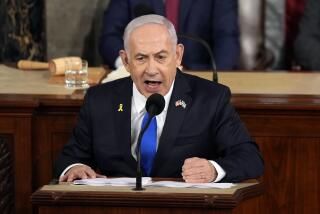Jordan Seeks Tank-Killing A-10 Fighter Jets From U.S.
- Share via
AMMAN, Jordan — U.S. Defense Secretary William S. Cohen said Saturday that Jordan, a key Arab ally since it distanced itself from Iraq, had asked Washington to supply tank-killing A-10 fighter jets to bolster its air force.
Cohen, beginning his first visit to the Middle East as Defense secretary, spoke to reporters after meeting Jordan’s Prime Minister Abdul Salam Majali.
He said Jordan, which earlier this year took delivery of 16 used F-16 fighter jets as part of U.S. military aid to the kingdom, was seeking further assistance.
“There was an indication that the A-10 might be required as an antiarmor mechanism,” Cohen said.
The heavily armored A-10 fighter jets operate mainly on low-flying missions and were used to destroy large numbers of Iraqi tanks in the 1991 Persian Gulf War. They are no longer built and are in the process of being phased out of the U.S. Air Force inventory.
Cohen did not say if the United States would be able to meet Jordan’s request.
Earlier, Cohen said the United States will maintain a military presence in the Persian Gulf region to ensure that Iraq complies with U.N. resolutions.
He also reiterated that U.N. sanctions on Iraq will remain until Iraqi President Saddam Hussein produces evidence that the country has destroyed its weapons of mass destruction.
In a report Friday, U.N. experts said they made “virtually no progress” in the last six months in determining whether Iraq has destroyed the weapons.
Iraqi Foreign Minister Mohammed Said Sahaf on Saturday dismissed the report as “boring and . . . baseless” and demanded that the United Nations put a time limit on inspections of Hussein’s presidential sites.
The U.S. military presence, beefed up earlier this year during a standoff with Hussein over the weapons inspections, will remain “for the foreseeable future to make sure there is full compliance with U.N. resolutions,” Cohen said.
If the United States decides to reduce its military strength in the region, “we may be able to structure it in a way that allows us to have a surge capacity . . . so that we could reconstitute it quickly,” he said.
Cohen is on a Middle East tour that also will take him to Egypt, Israel and Greece. He already has met with a U.S.-led force in southern Turkey that protects Kurds in northern Iraq.
More to Read
Sign up for Essential California
The most important California stories and recommendations in your inbox every morning.
You may occasionally receive promotional content from the Los Angeles Times.













